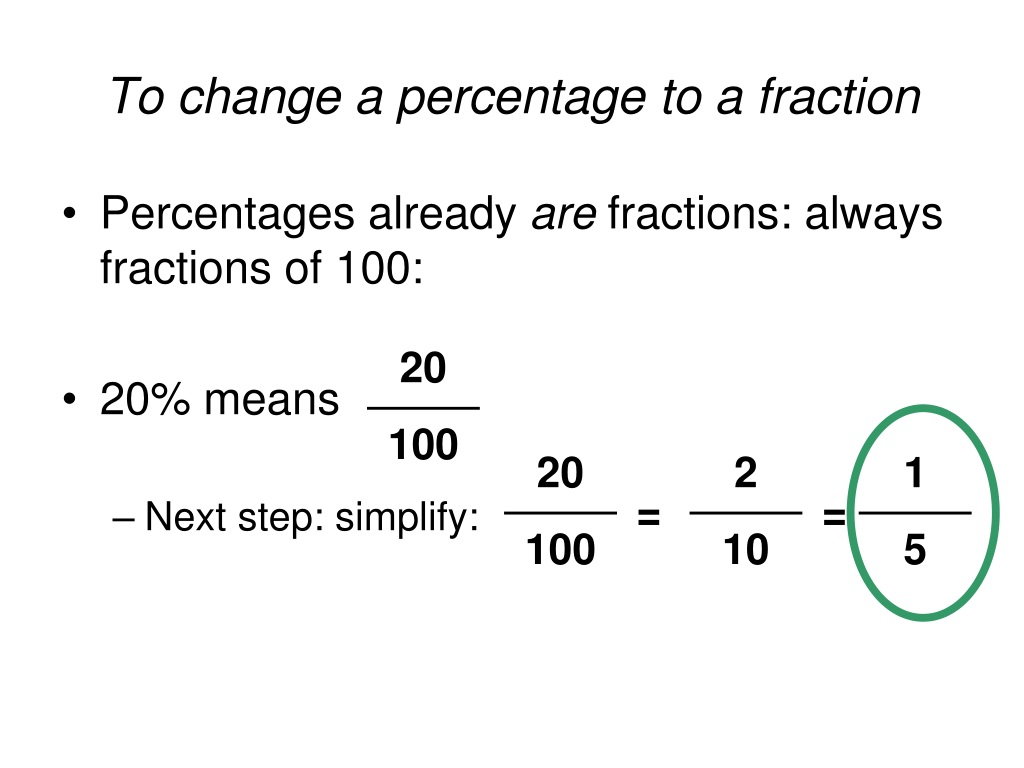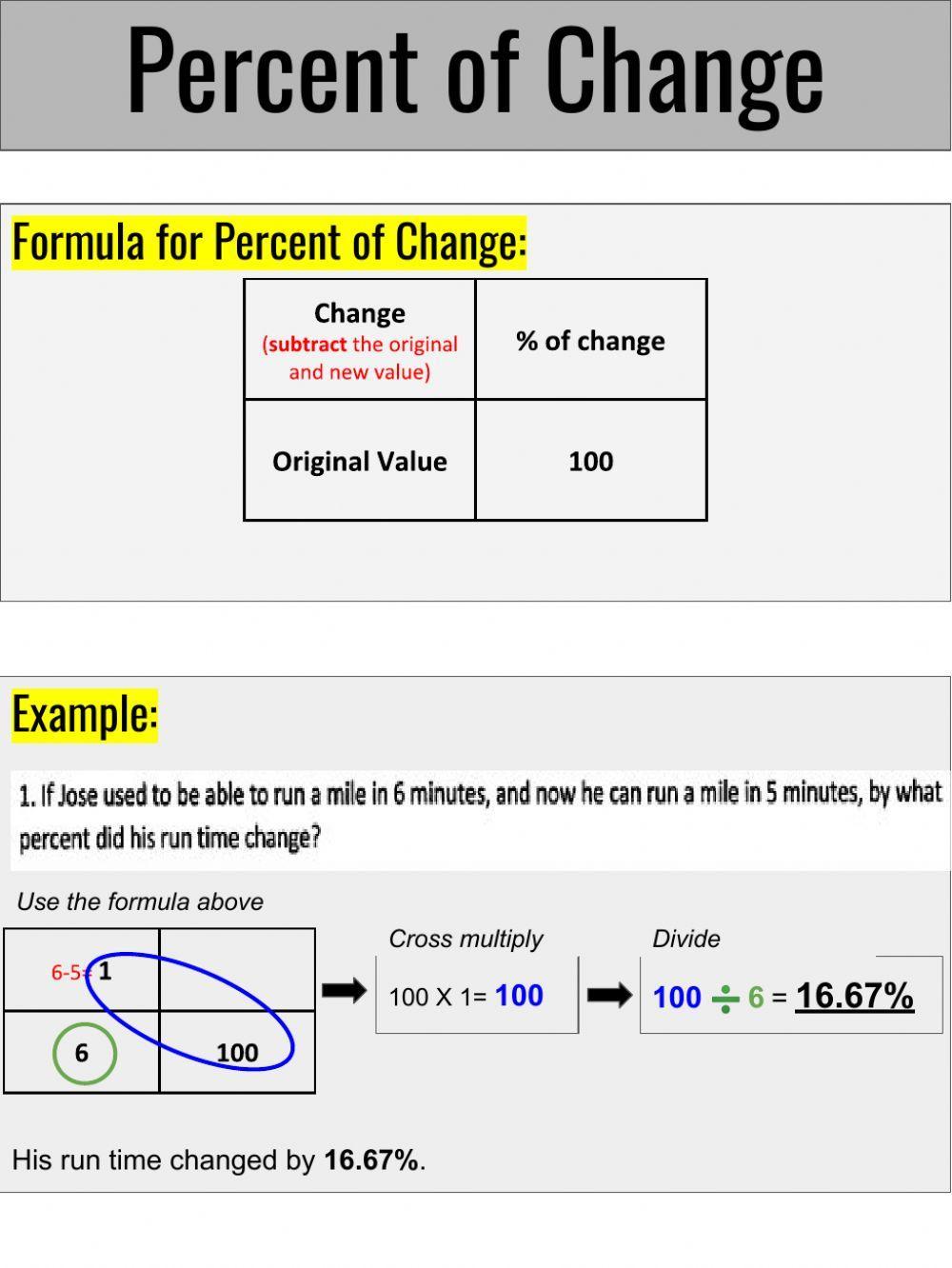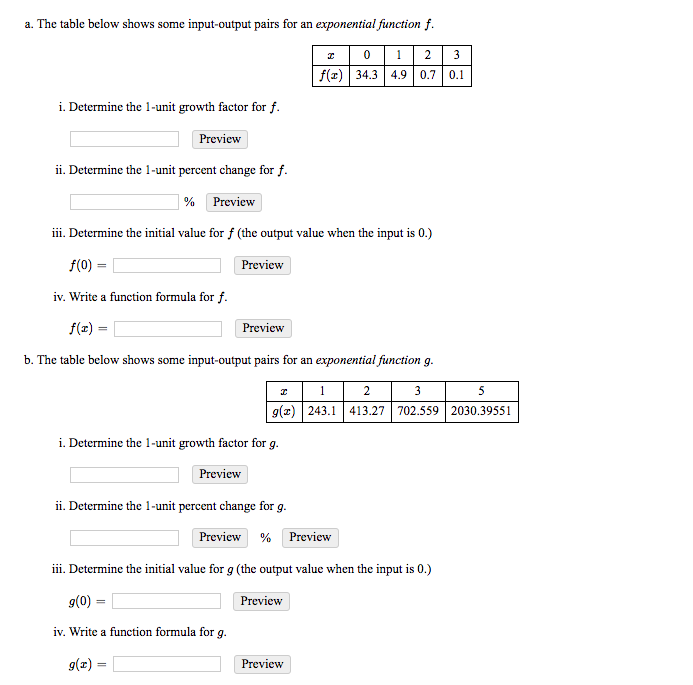This percent change calculator lets you calculate the percent change if you know the initial and final values. It can also calculate for you the initial (final) value if you know the final (initial) value and the percent change. The calculator will give tell not just the answer, but also how to calculate the precent change or initial/final value.
Percent of Change interactive worksheet | Live Worksheets
Formula Growth factor = ( 1 ± p 1 0 0 ), where p is the percentage. When increasing, use ( 1 + p 1 0 0 ). When reduction, use ( 1 − p 1 0 0 ). Let me explain the formula: Inside the parentheses you have a number one, plus or minus, and the fraction p 1 0 0. The number one represents what you should calculate the percentage of.

Source Image: chegg.com
Download Image
Aug 17, 2023How to Calculate Percentage Change: Example 1 What is the percentage change, as an increase or decrease, to go from 3.50 to 2.625? Let V 1 = 3.50 and V 2 = 2.625 and plug numbers into the percentage change formula (V2 −V1) |V1| × 100 ( V 2 − V 1) | V 1 | × 100 = (2.625 − 3.50) |3.50| × 100 = ( 2.625 − 3.50) | 3.50 | × 100

Source Image: motorsport.com
Download Image
Mod4Inv3: 1-Unit Growth and Decay Factors – YouTube 0.25 X 100 = -25% The negative percent change (-25%) indicates that Fred’s savings account balance decreased by 25%. In this example, the shift in value over a year is a decrease of $3000 (-3000). That -3000 is -25% of the baseline value of 12,000.

Source Image: slideserve.com
Download Image
Determine The 1-Unit Percent Change For F
0.25 X 100 = -25% The negative percent change (-25%) indicates that Fred’s savings account balance decreased by 25%. In this example, the shift in value over a year is a decrease of $3000 (-3000). That -3000 is -25% of the baseline value of 12,000. Find the Percentage Rate of Change f(t)=1500(1.074)^t. Step 1. Since is greater than , there is an exponential growth. Step 2. Setup the rate equation. Step 3. Solve for to determine the growth factor. Tap for more steps… Step 3.1. Move all terms not containing to the right side of the equation. Tap for more steps… Step 3.1.1. Subtract from
PPT – % Percentages % PowerPoint Presentation, free download – ID:9628899
Grammar checker Expert proofreading This problem has been solved! You’ll get a detailed solution from a subject matter expert that helps you learn core concepts. f ( − 2) = 1.8 Transcribed image text a. Determine the 1-unit growth factor for . b. Determine the 1-unit percent change for c. Determine the initial value of d. 1047: Approximations – explain xkcd

Source Image: explainxkcd.com
Download Image
How to Find value of a function, 1-unit growth factor and 1-unit percent change of a given function – YouTube Grammar checker Expert proofreading This problem has been solved! You’ll get a detailed solution from a subject matter expert that helps you learn core concepts. f ( − 2) = 1.8 Transcribed image text a. Determine the 1-unit growth factor for . b. Determine the 1-unit percent change for c. Determine the initial value of d.

Source Image: m.youtube.com
Download Image
Percent of Change interactive worksheet | Live Worksheets This percent change calculator lets you calculate the percent change if you know the initial and final values. It can also calculate for you the initial (final) value if you know the final (initial) value and the percent change. The calculator will give tell not just the answer, but also how to calculate the precent change or initial/final value.

Source Image: liveworksheets.com
Download Image
Mod4Inv3: 1-Unit Growth and Decay Factors – YouTube Aug 17, 2023How to Calculate Percentage Change: Example 1 What is the percentage change, as an increase or decrease, to go from 3.50 to 2.625? Let V 1 = 3.50 and V 2 = 2.625 and plug numbers into the percentage change formula (V2 −V1) |V1| × 100 ( V 2 − V 1) | V 1 | × 100 = (2.625 − 3.50) |3.50| × 100 = ( 2.625 − 3.50) | 3.50 | × 100

Source Image: m.youtube.com
Download Image
Mod4Inv3: 1-Unit Growth and Decay Factors – YouTube The percentage rate of change for the function is the value of the derivative ( rate of change) at 1 1 over the value of the function at 1 1. f ‘(1) f (1) f ′ ( 1) f ( 1) Substitute the functions into the formula to find the function for the percentage rate of change. 2x+2 x2 + 2x 2 x + 2 x 2 + 2 x Factor 2 2 out of 2x+2 2 x + 2.

Source Image: m.youtube.com
Download Image
DJI Mini 3 In-Depth Review: Everything You Need To Know! 0.25 X 100 = -25% The negative percent change (-25%) indicates that Fred’s savings account balance decreased by 25%. In this example, the shift in value over a year is a decrease of $3000 (-3000). That -3000 is -25% of the baseline value of 12,000.

Source Image: dronexl.co
Download Image
Solved a. The table below shows some input-output pairs for | Chegg.com Find the Percentage Rate of Change f(t)=1500(1.074)^t. Step 1. Since is greater than , there is an exponential growth. Step 2. Setup the rate equation. Step 3. Solve for to determine the growth factor. Tap for more steps… Step 3.1. Move all terms not containing to the right side of the equation. Tap for more steps… Step 3.1.1. Subtract from

Source Image: chegg.com
Download Image
How to Find value of a function, 1-unit growth factor and 1-unit percent change of a given function – YouTube
Solved a. The table below shows some input-output pairs for | Chegg.com Formula Growth factor = ( 1 ± p 1 0 0 ), where p is the percentage. When increasing, use ( 1 + p 1 0 0 ). When reduction, use ( 1 − p 1 0 0 ). Let me explain the formula: Inside the parentheses you have a number one, plus or minus, and the fraction p 1 0 0. The number one represents what you should calculate the percentage of.
Mod4Inv3: 1-Unit Growth and Decay Factors – YouTube DJI Mini 3 In-Depth Review: Everything You Need To Know! The percentage rate of change for the function is the value of the derivative ( rate of change) at 1 1 over the value of the function at 1 1. f ‘(1) f (1) f ′ ( 1) f ( 1) Substitute the functions into the formula to find the function for the percentage rate of change. 2x+2 x2 + 2x 2 x + 2 x 2 + 2 x Factor 2 2 out of 2x+2 2 x + 2.